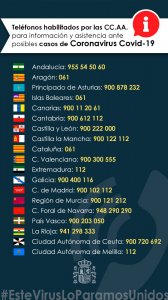Report updated in Spain at 12h on Saturday 11 April.
Figures released by Spain’s Health Ministry on Saturday 11 April show the lowest daily increase in deaths (510) from Coronavirus (Covid-19) for a 24 hour period since 23 March, as non-essential workers prepare a return to work after Easter.
The latest official figures now confirm 161,852 known cases of Coronavirus in Spain, a daily increase of 4,830. Friday’s figure had been an increase of 4,576 on Thursday – and Thursday had been an increase of 5,756 over Wednesday.
16,353 people have now died from the pandemic in Spain, up by 510 on Friday – but now the lowest daily increase since 23 March.
Friday had seen an increase in deaths of 605 – with Thursday’s figure having been 683. Wednesday had seen an increase of 757 over Tuesday.
59,109 people have now made a full recovery.
Of the official figures announced, 45,849 confirmed cases are known to be in the Madrid region, and where 6,084 have died (from the total 16,353 across the country).
There are now 32,984 cases in Catalonia (3,331 deaths), 10,515 in the Basque Country (765 deaths), 9,712 in Andalusia (737), 13,456 in Castilla La Mancha (1,483) and 8,578 in Valencia region (818).
Figures for those infected with Coronavirus in other regions are as follows: Aragón 3,969 (425 deaths), Asturias 1,827 (128 deaths), Balearic Islands 1,507 (102), Canary Islands 1,887 (95), Cantabria 1,719 (107), Castilla y León 11,543 (1,180), Ceuta 93 (4), Extremadura 2,486 (303), Galicia 7,176 (261), Melilla 98 (2), Murcia 1,413 (94), Navarra 3,817 (227) and La Rioja 3,223 (207).
For four days now, the Spanish Health Ministry has not been giving figures for the number of people in intensive care units (ICUs), because Spain’s regions have been using different methods to collate these figures.
The true number of deaths from Coronavirus in Spain could also be higher, since health authorities have admitted that only those who died after testing positive have been included in the official death toll.
Some regional authorities have warned that the number of death certificates issued, particularly for those who have died in residential homes, is higher than the official death toll.
There have also been issues with the timing of statistics sent to Madrid’s Health Ministry from each region, particularly during the weekend periods. Figures issued on Tuesdays by the ministry have sometimes reflected statistics not taken into account during the reports issued on Saturday and Sunday.
ALSO READ: Coronavirus in Spain full update (10 April)

GLOBAL OVERVIEW
The global death toll from the Coronavirus (Covid-19) pandemic has now surpassed 102,000 with 1.7m people known to be infected, according to data compiled by the Johns Hopkins University in the USA, with nearly 70% of the fatalities in Europe.
The USA, now the pandemic’s epicentre, became the first nation to record more than 2,000 deaths in 24 hours, and is close to Italy‘s total figure of 18,849 fatalities. US President Donald Trump said that the US infection rate was ‘near the peak’, however, and that social distancing was working well. He also said that he was considering ways to re-open the USA economy as soon as possible.
The World Health Organization (WHO) has warned that prematurely lifting lockdown restrictions anywhere could spark a dangerous resurgence of the disease.
Glimmers of hope are emerging in some countries, however – including the downward trend in daily deaths and infections in Spain.
The daily rises in new infections in Italy have also slowed dramatically – yet the Italian government has said that it will extend the lockdown until 3 May.
In the UK, where the government has resisted calls to ease the lockdown measures, Prime Minister Boris Johnson has shown signs of recovery after three days in intensive care. A Downing Street spokesman said that ‘the prime minister has been able to do short walks, between periods of rest’.
CORONAVIRUS in SPAIN
Non-essential workers can return to work
The current ‘state of alarm’ lockdown in Spain has now been officially extended until 26 April.
Spain originally commenced its lockdown for two weeks from 14 March, with measures that confined everyone to their homes apart from leaving to purchase food or medication, or to go to their place of work only if they could not perform their duties from home. The measures were then extended until 12 April.
From Monday 30 March, further new measures ordered all non-essential workers in Spain to also remain at home until Thursday 9 April inclusive, thereby returning to work during or after the Easter weekend (Monday 13 April is a holiday in most regions of Spain).
Under the new extension of the original lockdown measures, therefore, all non-essential workers can now also officially return to work.

Speaking on Friday, María José Sierra from the Spanish Health Ministry’s Coordination Center for Health Alerts said, ‘We are now returning to the situation of two weeks ago … if someone has symptoms it is important that they stay at home and isolate, and that they get in touch with the health system. But more specific instructions are on their way. We are returning to a situation with a lot of social distancing, which we believe is going to reduce transmission. We do not think that infections are going to rise.’
María José Rallo del Olmo, the general secretary for Spain’s transport department also said that companies should be ‘flexible when it comes to start times’ and that ‘rush hours should be stretched out so that the number of workers on public transportation is reduced’.
Spanish government to distribute masks
The Spanish authorities also announced on Friday that they would begin to distribute face masks at public transport stops on Monday as non-essential sectors return to work.
Spanish Health Minister Salvador Illa said that the government recommends the use of masks in addition to following other hygiene and social distancing measures and confirmed that another million rapid diagnostic tests would be given to regional authorities throughout Spain starting on Friday.
In Catalonia, the government is against lifting the lockdown for workers of non-essential services next week, and has said it should not be done without testing people.
‘Without tests, going to work is recklessness,’ said the Catalan president, Quim Torra. He has also said that 14m masks would be made available to distribute to residents throughout Catalonia from 20 April.
Torra said on Thursday that the masks would be distributed in an ‘orderly’ manner, with people able to claim them simply by showing their CatSalut public health card. Catalan government spokesperson Meritxell Budó also stated that everybody’s first mask would be free.
Border controls also extended
The Spanish government has also extended its land border controls with France and Portugal for another two weeks, until midnight on Saturday 25 April, according to a statement from the Interior ministry. The measure may be extended further ‘if necessary’, it was also confirmed.
ALSO READ: Spain publishes list of hotels that will remain open
Since 17 March, there have been checkpoints at border crossings, such as La Jonquera, with Spanish police only allowing Spanish passport holders, residents and cross-border workers to travel freely.
People who wish to cross the border for reasons of ‘force majeure’ must carry suitable documentation as proof. The measures do not apply to goods transportation, in order to maintain supply chains and vital economic activity.
ALSO READ: The new restrictions at Spain’s airports, ports and land borders
There are also checks for passengers arriving at ports and airports, in effect since 23 March.
Only EU residents (and other associated Schengen Agreement countries) attempting to return home, visa holders travelling to those countries, cross-border workers, healthcare professionals or those working with elderly people, freight workers, diplomats, or those who can prove force majeure are able to travel through ports and airports.
This report is currently being updated.
Below are the numbers to call for each region of Spain for information and assistance in the event of possible cases of Coronavirus – as issued by the Spanish health authorities.

Up-to-date WHO advice and facts (in English) about the Coronavirus epidemic can be found here: www.who.int/emergencies/diseases/novel-coronavirus-2019/technical-guidance.
Our previous reports on Coronavirus in Spain:
ALSO READ: Coronavirus in Spain full update (10 April)
ALSO READ: Coronavirus in Spain full update (9 April)
ALSO READ: Coronavirus in Spain full update (8 April)
ALSO READ: Coronavirus in Spain full update (7 April)
ALSO READ: Coronavirus in Spain full update (6 April)
ALSO READ: Coronavirus in Spain full update (5 April)
ALSO READ: Coronavirus in Spain full update (4 April)
ALSO READ: Lockdown in Spain set to be extended until 26 April
ALSO READ: Coronavirus in Spain full update (3 April)
ALSO READ: Coronavirus in Spain: unemployment figures worst on record
ALSO READ: Coronavirus in Spain full update (2 April)
ALSO READ: Coronavirus in Spain full update (1 April)
ALSO READ: Coronavirus in Spain full update (31 March)
ALSO READ: FC Barcelona players agree to 70% pay cut, and will ensure staff receive 100%
ALSO READ: Coronavirus in Spain full update (30 March)
ALSO READ: Coronavirus in Spain full update (29 March)
ALSO READ: Coronavirus in Spain full update (28 March)
ALSO READ: Coronavirus in Spain full update (27 March)
ALSO READ: Coronavirus in Spain full update (26 March)
ALSO READ: Animal rights NGO starts petition against possible state aid for cancelled bullfights
ALSO READ: Spain publishes list of hotels that will remain open
ALSO READ: Coronavirus in Spain full update (25 March)
ALSO READ: Coronavirus in Spain full update (24 March)
ALSO READ: Video of boy training as goalkeeper in isolation goes viral
ALSO READ: The new restrictions at Spain’s airports, ports and land borders
ALSO READ: Coronavirus in Spain full update (23 March)
ALSO READ: Madrid starts receiving patients at IFEMA exhibition centre ‘hospital’
ALSO READ: Confirmed: lockdown extended until at least 11 April
ALSO READ: Coronavirus in Spain full update (22 March)
ALSO READ: Walking a goat or a Vietnamese pig is not allowed
ALSO READ: Coronavirus in Spain – full advice for British travellers seeking to return to the UK
ALSO READ: Coronavirus in Spain full update (21 March)
ALSO READ: Coronavirus in Spain full update (20 March)
ALSO READ: ‘This virus we will stop together’ – video
ALSO READ: Coronavirus in Spain full update (19 March)
ALSO READ: Despite lockdown, Spaniards applaud health workers from balconies every evening
Editor’s note:
At Spain in English we’re always keen to also publish positive stories and features about life in Spain – not just the current news. With all cultural and sporting events currently on hold, as well as travel and gastronomic excursions, we welcome on-going contributions from all of you who’d like to send us articles for publication. Although we are unable to currently pay for contributions, we will certainly credit you and share the articles across our social media network (if of interest) – and/or also link to your own blogs or other sites. We currently welcome upbeat, positive and fun articles – perhaps how you’re coping with the ‘lockdown’ in your own area of Spain – or how your community is responding, or recommendations of help to others. We have a dedicated ‘Opinion, Blogs & Spanish Experiences‘ section where your articles will appear. We will edit for clarity and length only – and we reserve the right to not publish. Articles should be sent via email to editorial@spainenglish.com (preferably with a photo and credit details), and should be around 500 words (800 to 1,000 max). We will try to respond to everyone, but please be patient with us. We’re a very small team but with big ambitions! Please stay safe. Thank you for reading and following us.


